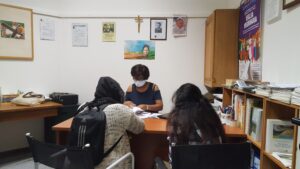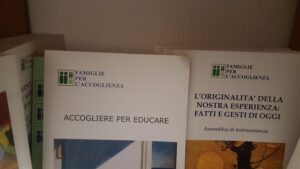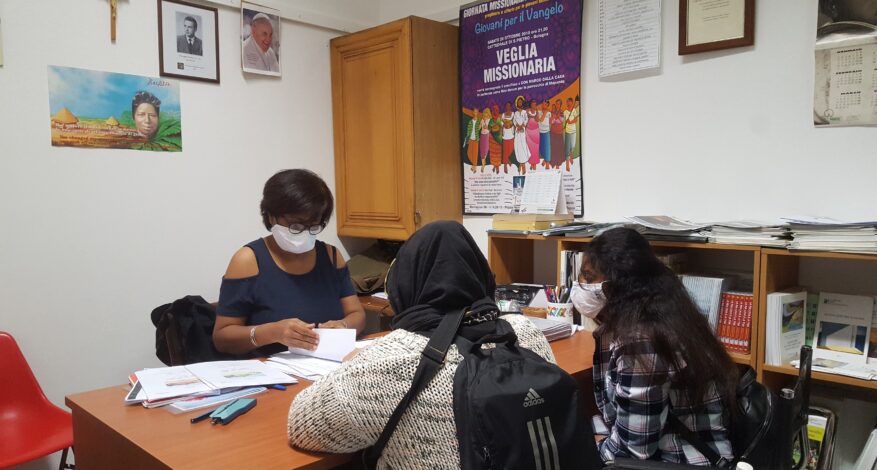AN INTEGRATION PROJECT FOR IMMIGRANTS
IMMIGRATION IN ITALY
In the last twenty years, immigration started to become a more and more consistent dynamic in Italy. Thousands and thousands of immigrants have been arriving at the Italian coasts after leaving their homelands because of wars, conflicts, or simply out of despair.
Most of these people, speaking different languages, with different backgrounds and different traditions, struggle a lot to integrate. The bureaucratic impediments are huge, foreign immigrants need to rapidly learn how to deal with a completely new lifestyle and, at the same time, to completely re-arrange their lives, find a job and send children to school. This becomes even more difficult if we consider the element of prejudice, hate, and discrimination that immigrants must face daily.
THE RESPONSE OF CIVIL SOCIETY
 The difficulties of these struggling people did not go unnoticed, at least in some contexts, and a little part of civil society mobilized in their favour, driven forward by the ideals of equality, integration, and faith in human rights. In 2016, Emi Rehana Ferdus and Simonetta Pirazzini started a project in Bologna – a city which in 2015 had a number of 115.809 registered foreigners – aimed at helping them in their path towards integration through the opening of a “Centre of Orientation and Preventive Education” for immigrants. Immigrated individuals and families can freely access this “Listening Centre”, where they will be able to find spot-on answers to all their questions regarding healthcare, education, house, job, and how to obtain the right documents for daily life.
The difficulties of these struggling people did not go unnoticed, at least in some contexts, and a little part of civil society mobilized in their favour, driven forward by the ideals of equality, integration, and faith in human rights. In 2016, Emi Rehana Ferdus and Simonetta Pirazzini started a project in Bologna – a city which in 2015 had a number of 115.809 registered foreigners – aimed at helping them in their path towards integration through the opening of a “Centre of Orientation and Preventive Education” for immigrants. Immigrated individuals and families can freely access this “Listening Centre”, where they will be able to find spot-on answers to all their questions regarding healthcare, education, house, job, and how to obtain the right documents for daily life.
Emi explains that “those who arrive in Italy for the first time and for different reasons as immigrants, need to follow different bureaucratic paths accordingly to their background and their status. If they are refugees seeking political asylum, they will need to follow a specific path. If they arrived in Italy for familiar reunification, they would have to follow a different path. If they are students another different path and so on. This complexity results to be very disorientating for most of them.”
Emi and her colleagues have found that all these “paths”, if not accompanied by someone sustaining the immigrants’ causes, might lead to a vicious cycle in which the foreigners end up losing money, time, and patience until they get in touch with private “agencies”. These structures claim to act in the immigrants’ interest when they just want to exploit their vulnerabilities to take as much money as possible out of their pockets. Emi’s project wants to avoid all of that.
PREVENTIVE ORIENTATION
“Our work with the immigrants starts from the moment they get in touch with us. From the first time we talk with them, we try to understand what their necessity really is and how we can help them practically, providing them with the right indications to obtain the documents and the advice they need, and with the ultimate goal of making them more independent and free”.
 To reach this condition, immigrants can also count on a collaboration between the centre and the “Penny Wirton” school: “the teaching of the Italian language is extremely important for preventive orientation. The school we work with is entirely constituted by volunteers, who need to be formed and taught on how to manage the relationship with our assisted and on how to grasp their inner insecurities and their true needs. They do an amazing job in building confidence between us and them, which also positively affects the learning process and, consequently, their path towards integration.”
To reach this condition, immigrants can also count on a collaboration between the centre and the “Penny Wirton” school: “the teaching of the Italian language is extremely important for preventive orientation. The school we work with is entirely constituted by volunteers, who need to be formed and taught on how to manage the relationship with our assisted and on how to grasp their inner insecurities and their true needs. They do an amazing job in building confidence between us and them, which also positively affects the learning process and, consequently, their path towards integration.”
THE PRESENT SITUATION
In the period from January to July, the centre managed to provide substantial help to 27 families and 10-15 individuals, for a total of 50-60 people assisted. The Coronavirus pandemic did not stop their work, and in the March-July period, they reached the peak of people assisted through telephonic calls. Moreover, this project, since February 2020, can count on the recognition by the social organization “Pace Adesso”, which allows the Centre to be given some funds in order to sustain its works with the immigrants.
“Our Listening Centre is a relatively new project, but we are growing, and we hope to continue in our community-building mission of integration, hospitality, and dialogue”.

